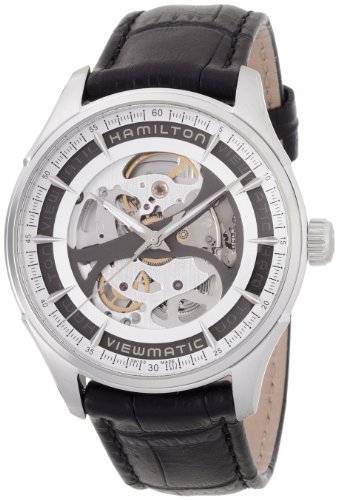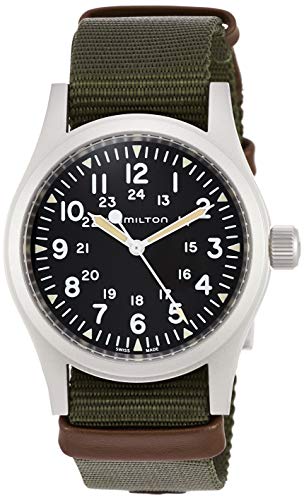If you’re a watch enthusiast like me, you’ve probably heard of Hamilton Watches. With their timeless designs and rich history, these timepieces have captured the hearts of many. But, have you ever wondered just how accurate they are? As watch collectors, we all want a timepiece that not only looks stylish but also tells time with precision. In this blog post, we will delve into the accuracy of Hamilton Watches, exploring the factors that contribute to their timekeeping and uncovering the truth behind their reputation. So, grab your favorite cup of coffee and join me as we unravel the mystery of Hamilton’s accuracy.
Top-selling timepieces from Hamilton Watches
What makes Hamilton watches accurate?
When it comes to choosing a timepiece, accuracy is undoubtedly one of the most important factors to consider. Hamilton watches have long been renowned for their precision and reliability, making them a favorite among watch enthusiasts and professionals alike. In this blog section, we will explore the key factors that contribute to the accuracy of Hamilton watches, including high-quality movements, precise manufacturing techniques, and rigorous testing processes.
High-quality movements
The heart of any watch is its movement, often referred to as the “engine” that drives its functionality. Hamilton takes great pride in equipping their watches with exceptional movements, known for their accuracy and longevity. Here are some reasons why Hamilton movements are considered to be of high quality:
- Swiss precision: Hamilton sources its movements from the reputable Swiss watchmaking industry. This ensures that the watches are equipped with time-tested and reliable mechanisms.
- Mechanical excellence: Hamilton offers a range of both automatic and manual-winding movements. The mechanical movements are meticulously crafted with intricate precision, enabling them to keep time with exceptional accuracy.
- Advanced technology: Hamilton blends traditional watchmaking techniques with modern advancements in technology. This fusion results in movements that are not only precise but also equipped with additional features such as chronographs and GMT functions.
Precise manufacturing techniques
The accurate performance of a watch is not solely dependent on its movement. The overall design and manufacturing processes play a crucial role in ensuring precise timekeeping. Hamilton pays meticulous attention to these aspects to guarantee accuracy. Here are some important manufacturing techniques employed by Hamilton:
- Hand assembly: Each Hamilton watch undergoes a meticulous assembly process, often performed by skilled watchmakers. This hands-on approach ensures that every component is precisely fitted together, minimizing any possible variations that could affect accuracy.
- Quality materials: Hamilton watches are crafted using premium materials to ensure durability and accuracy. The selection of high-quality metals, crystals, and other watch components contributes to the overall precision and longevity of the watch.
- Exacting tolerances: During the manufacturing process, Hamilton adheres to strict tolerances. This means that each part is carefully measured and crafted to fit within predetermined specifications, ensuring the watch functions accurately.
Rigorous testing processes
To ensure the utmost accuracy and reliability, Hamilton subject their watches to rigorous testing procedures. These processes help identify any potential issues and guarantee that each timepiece meets their high standards. Here are some of the testing processes performed by Hamilton:
- Chronometer certification: Some Hamilton watches undergo chronometer certification, meaning they are subjected to extensive testing by an independent organization such as COSC (Contrôle Officiel Suisse des Chronomètres). Only watches that pass stringent accuracy tests receive this certification.
- Water resistance testing: Hamilton ensures that their water-resistant watches undergo meticulous testing to verify their water resistance capabilities. This guarantees that the watch can withstand the specified water pressure without compromising accuracy.
- Shock resistance testing: Watches are tested for their resistance against shock and vibrations to ensure that external factors do not affect their accuracy and functionality.
In conclusion, Hamilton watches are renowned for their accuracy thanks to a combination of factors that include high-quality movements, precise manufacturing techniques, and rigorous testing processes. The attention to detail, reliability, and extraordinary craftsmanship make Hamilton watches a top choice for those seeking accurate timekeeping. So, whether you are a professional diver or simply someone who appreciates precision, a Hamilton watch is sure to meet your expectations.
Hamilton’s chronometer certification
When it comes to timekeeping precision, few brands can match the commitment and accuracy of Hamilton watches. With a rich heritage dating back to 1892, Hamilton has long been synonymous with quality and reliability. One of the key elements that sets Hamilton apart is their dedication to chronometer certification.
What is Chronometer Certification?
Precision in Timing
A chronometer is a timepiece that has undergone rigorous testing to ensure its accuracy. In order to be certified as a chronometer, a watch must meet strict standards set by independent testing bodies, such as the Contrôle Officiel Suisse des Chronomètres (COSC) in Switzerland. These testing organizations meticulously assess the timekeeping abilities of a watch and scrutinize its ability to maintain accurate time over extended periods.
Stringent Testing Process
To earn the coveted chronometer certification, Hamilton watches must undergo a series of extensive tests. These tests evaluate various aspects of the watch’s performance, including:
- Rate Variation: The watch is subjected to different positions and temperatures to measure the consistency of its timekeeping.
- Water Resistance: The timepiece is tested for water resistance, ensuring its reliability even in wet conditions.
- Power Reserve: The watch is evaluated to determine how long it can run accurately without winding.
- Shock Resistance: The watch must withstand shocks and vibrations to ensure durability in everyday activities.
Hamilton’s Assurance of Accuracy
Commitment to Quality
Hamilton understands the importance of accuracy in timekeeping, and their chronometer certification is a testament to their commitment to quality. By subjecting their watches to the stringent testing process, Hamilton ensures that their timepieces meet the highest standards of precision.
Independent Verification
Chronometer certification is not granted by Hamilton themselves but by independent testing organizations. This means that the accuracy of Hamilton watches is confirmed by unbiased experts in the field, providing customers with added confidence in their purchase.
Key Benefits of Chronometer Certification
Choosing a Hamilton chronometer-certified watch comes with a range of benefits, including:
- Reliability: Hamilton watches go through exhaustive tests to ensure they can maintain accurate timekeeping, making them highly reliable timepieces for daily wear.
- Precision: Chronometer-certified watches are designed to be exceptionally accurate, ensuring you can rely on them for precise timekeeping.
- Longevity: The rigorous testing procedures also guarantee the durability of Hamilton watches, allowing them to withstand everyday wear and tear.
- Resale Value: The chronometer certification adds value to the watch, making it a valuable asset in the long run.
| Feature | Hamilton Chronometer-Certified Watches |
|---|---|
| Certification | COSC (Contrôle Officiel Suisse des Chronomètres) |
| Accuracy | Highly accurate, meeting strict standards |
| Reliability | Timekeeping precision even in challenging conditions |
| Durability | Ability to withstand shocks and vibrations |
| Value | Enhanced resale value |
Real-world accuracy of Hamilton watches
When it comes to purchasing a timepiece, accuracy is a crucial factor to consider. No one wants a watch that consistently lags behind or races ahead of the correct time. Hamilton, a renowned Swiss watchmaker, is known for producing high-quality timepieces with exceptional precision and reliability. In this blog section, we will delve into customer reviews and experiences to gain insights into the real-world accuracy of Hamilton watches in everyday use. Let’s explore!
Customer Reviews Paint a Positive Picture
One of the first things that become apparent when reading customer reviews of Hamilton watches is the overwhelming praise for their accuracy. Many customers rave about how Hamilton watches consistently maintain accurate timekeeping, surpassing their expectations. Here are some key points that customers frequently highlight:
- Consistent Accuracy: Hamilton watches are touted for their consistent accuracy, with users reporting minimal deviations in timekeeping over extended periods.
- Exceptional Precision: Numerous customers have praised the exceptional precision of Hamilton watches, often comparing them to more expensive luxury brands in terms of accuracy.
- Reliable Quartz Movements: Quartz movement, being highly accurate, is a hallmark of Hamilton watches. Users appreciate the reliable timekeeping offered by this technology.
Reported Issues and Variations in Accuracy
While the majority of Hamilton customers are satisfied with the accuracy of their timepieces, a few reports indicate occasional issues or variations in accuracy. These experiences are relatively rare, but it’s important to provide a balanced viewpoint. Here are some key points to consider:
- Mechanical vs. Quartz: Some users have reported slight variations in accuracy between mechanical and quartz Hamilton watches. Mechanical watches, while incredibly intricate and captivating, might require occasional adjustments for optimal accuracy.
- Environmental Factors: Extreme temperature changes can influence the accuracy of any watch, including Hamilton timepieces. While these variations are usually minimal, they are worth mentioning to provide a comprehensive perspective.
- Regular Servicing: Like any mechanical device, regular servicing is recommended to maintain the accuracy of a Hamilton watch. Customers who adhere to the manufacturer’s recommended servicing intervals usually experience consistent accuracy levels.
Key Takeaways
In summary, customer reviews indicate that Hamilton watches are highly accurate and reliable timekeeping companions in everyday use. Here are the key takeaways:
- Hamilton watches are praised for their consistent accuracy and exceptional precision.
- Quartz movement is frequently commended for providing reliable timekeeping.
- While variations in accuracy exist, they are relatively infrequent and often minor.
- Extreme temperature changes and the choice between mechanical and quartz movements may have a slight impact on accuracy.
- Regular servicing is recommended to ensure optimal accuracy and longevity of a Hamilton watch.
To learn more about specific models and their accuracy, referring to individual customer reviews and conducting additional research can provide valuable insights.
Sources:
- Hamilton Watches Official Website
- Customer Reviews on Hamilton Watches across reputable watch forums and retail websites
Factors affecting accuracy
Mechanical watches have been a symbol of precision and craftsmanship for centuries. However, various factors can affect their accuracy over time. In this blog section, we will explore some of the key factors that can impact the timekeeping ability of mechanical watches, and how to address them.
1. Temperature Changes
Temperature changes can significantly affect the accuracy of mechanical watches. The expansion and contraction of the materials due to temperature fluctuations can influence the movement’s precision. Extreme hot or cold temperatures can cause parts to expand or contract unevenly, leading to variations in timekeeping. Here’s how temperature affects watches:
- Hot temperatures: High temperatures can make lubricants in the watch movement thin and less effective, leading to increased friction and potential accuracy issues.
- Cold temperatures: Cold temperatures can cause the lubricants to thicken, which might hinder the smooth operation of the movement and affect its accuracy.
To mitigate the impact of temperature changes, watch manufacturers often design watches to operate within specific temperature ranges. Some high-end timepieces can withstand extreme temperatures better than others due to improved materials and thermal compensators.
2. Magnetic Fields
Magnetic fields are another significant factor that can affect the accuracy of mechanical watches. Modern life exposes us to various magnetic sources, such as smartphones, magnetic clasps, speakers, and even airport security scanners. When a watch’s movement is exposed to a strong magnetic field, the delicate balance of the hairspring can be disrupted, affecting its ability to oscillate at a consistent rate.
To combat this issue, watchmakers have developed antimagnetic technologies. Several brands now incorporate materials like silicon or certain alloys in the movement to increase resistance to magnetic fields. These antimagnetic watches can withstand magnetic forces up to several thousand Gauss without affecting accuracy.
3. Regular Maintenance
Like any other intricate mechanism, regular maintenance is crucial for maintaining the accuracy of mechanical watches. Here’s how regular servicing and maintenance can help keep watches accurate:
- Cleaning and lubrication: Over time, the lubricants used in the movement can break down or dry out, leading to increased friction. Regular maintenance involves cleaning and lubricating the watch to ensure smooth operation.
- Adjustments and calibration: The intricate balance wheel and hairspring mechanism within a watch can experience slight shifts or disturbances with age. During servicing, adjustments and calibration are performed to ensure the watch keeps accurate time.
- Inspection and part replacement: Wear and tear can occur in the movement or other components of the watch. Regular maintenance allows for the inspection and replacement of worn or damaged parts, preventing potential accuracy issues.
Evaluating the precision and reliability of Hamilton timepieces
In conclusion, Hamilton watches are generally known for their accuracy, thanks to their reliable Swiss movements and commitment to precision. However, it’s important to note that individual experiences may vary based on factors like usage, maintenance, and external conditions. To ensure optimal accuracy, we recommend regular servicing by authorized professionals and proper care of your Hamilton timepiece. By doing so, you can enjoy the remarkable accuracy and longevity that these watches are renowned for.


















